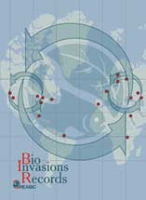
BioInvasions Records
Scope & Guideline
Exploring the frontiers of biological invasions research.
Introduction
Aims and Scopes
- Documentation of Non-Native Species:
The journal publishes detailed records of non-native species across various ecosystems, contributing to a comprehensive understanding of their distribution and establishment. - Impact Assessment:
Research articles often evaluate the ecological, economic, and social impacts of invasive species, providing critical insights into the consequences of biological invasions. - Management and Control Strategies:
The journal includes studies that discuss strategies for managing invasive species, including prevention, control, and eradication methods. - Genetic and Ecological Studies:
BioInvasions Records emphasizes interdisciplinary approaches, including genetic analyses and ecological studies, to understand the mechanisms behind species invasions. - Citizen Science Contributions:
The journal encourages contributions from citizen science initiatives, highlighting the role of public participation in monitoring and reporting invasive species.
Trending and Emerging
- Emerging Invasive Species:
There is an increasing emphasis on documenting newly discovered invasive species, particularly in previously unreported regions, highlighting the need for continuous monitoring. - Molecular Techniques in Invasion Biology:
The use of molecular methods, such as DNA barcoding and genetic analyses, is trending, allowing researchers to identify invasive species more accurately and understand their genetic diversity. - Invasive Species and Ecosystem Services:
Research is increasingly focusing on the implications of invasive species for ecosystem services, examining both negative impacts and potential benefits in modified ecosystems. - Public Engagement and Citizen Science:
The integration of citizen science into invasion biology is becoming more prominent, with studies showcasing how public participation aids in data collection and monitoring of invasive species. - Climate Adaptation Strategies:
Emerging studies are beginning to explore how invasive species management can align with broader climate adaptation strategies, indicating a growing recognition of the interconnectedness of these issues.
Declining or Waning
- Aquaculture Impacts:
Research focusing on the impacts of invasive species in aquaculture settings has decreased, possibly due to a saturation of existing knowledge or a shift towards terrestrial and freshwater invasions. - Invasive Species and Climate Change Interactions:
While still relevant, the direct exploration of climate change as a driving factor for invasion dynamics seems to be waning, as researchers may be focusing more on specific case studies rather than broad assessments. - Traditional Taxonomy of Invasive Species:
The emphasis on traditional taxonomic descriptions of newly introduced species is less frequent, as there is a growing preference for genetic and ecological approaches to understand invasions. - Invasive Species in Urban Environments:
There appears to be a decline in studies specifically targeting the impacts of invasive species in urban settings, as researchers may be prioritizing rural or natural ecosystems where invasions have more significant impacts.
Similar Journals
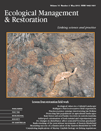
ECOLOGICAL MANAGEMENT & RESTORATION
Connecting science and practice in ecological management.Ecological Management & Restoration is a premier international journal published by Wiley, dedicated to advancing the fields of ecology, environmental management, conservation, and restoration practices. With an impact factor that positions it in the Q2 category across various ecological and management domains, this journal serves as a critical platform for researchers and professionals seeking to address contemporary issues related to ecosystem health, biodiversity, and sustainable management. Covering a wide range of topics from ecological restoration techniques to policy impacts on nature conservation, the journal caters to a diverse audience and contributes to the scientific community's understanding of environmental challenges. Importantly, the journal provides significant visibility, ranking in the top percentiles within key ecological research arenas such as Nature and Landscape Conservation, reinforcing its value for researchers aiming to influence both scientific thought and practical applications in ecology and management. The journal's commitment to disseminating high-quality research makes it an essential resource for students, researchers, and practitioners dedicated to fostering a sustainable future.
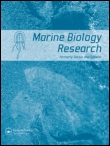
Marine Biology Research
Driving discoveries in aquatic science.Marine Biology Research is a premier journal published by Taylor & Francis, focusing on the dynamic field of marine biology and its intersecting realms of aquatic science, ecology, and oceanography. Since its inception in 2005, this journal has served as a crucial platform for researchers and professionals to disseminate their findings, with a vision extending to 2024 and beyond. The journal is recognized with a Q3 quartile ranking in both Aquatic Science and Ecology, Evolution, Behavior and Systematics, underscoring its growing influence in these fields as evidenced by its Scopus rankings. Located in the United Kingdom, Marine Biology Research aims to foster collaboration and innovation through open access options, facilitating knowledge exchange among the academic community. With a steady commitment to advancing marine sciences, this journal is an invaluable resource for those dedicated to understanding and preserving our ocean ecosystems.
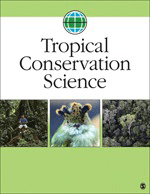
Tropical Conservation Science
Exploring solutions for tropical ecosystem conservation.Tropical Conservation Science, an esteemed journal published by SAGE Publications Inc, plays a pivotal role in the field of environmental science, particularly within the realms of ecology and nature conservation. Established as an Open Access platform since 2008, it facilitates global dissemination of critical research findings dedicated to the preservation of tropical ecosystems. With an impressive impact factor reflected in its Q2 rankings within both ecology and nature landscape conservation categories for 2023, the journal is ranked in the 66th percentile for Environmental Science and maintains a strong position in the academic community. The journal’s scope encompasses a wide array of tropical conservation issues and aims to foster interdisciplinary collaboration among researchers, professionals, and students committed to advancing conservation strategies. Tropical Conservation Science is not merely a publication; it's a vital resource contributing to the safeguarding of our planet's biodiversity.
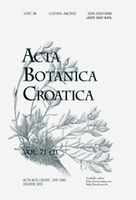
ACTA BOTANICA CROATICA
Shaping the Future of Ecology and Evolutionary StudiesACTA BOTANICA CROATICA is an esteemed interdisciplinary journal dedicated to the exploration and advancement of botanical sciences, published by UNIV ZAGREB, FAC SCIENCE, DIV BIOLOGY. Since its inception, this journal has embraced an Open Access model, enabling researchers and the global scientific community easy and unrestricted access to cutting-edge findings in plant biology, ecology, and evolutionary studies since 2011. Covering a broad spectrum from plant science to ecological and evolutionary behavior, ACTA BOTANICA CROATICA holds an important position in the academic landscape, currently classified in the Q3 quartile for both Ecology, Evolution, Behavior and Systematics and Plant Science categories. With a robust ranking in Scopus, it stands at #246 out of 516 in Plant Science and #360 out of 721 in Ecology, showcasing its commitment to quality research dissemination. The journal invites contributions from researchers, professionals, and students aiming to broaden the horizons of botanical research and foster collaboration within the scientific community.

Annual Review of Ecology Evolution and Systematics
Championing Rigorous Scholarship in Ecology and EvolutionThe Annual Review of Ecology, Evolution, and Systematics, published by Annual Reviews, is a leading academic journal dedicated to advancing the understanding of ecological and evolutionary processes. With a commendable impact factor and impressive rankings—9th in both the Ecology, Evolution, Behavior and Systematics category and the Environmental Science category—this journal is recognized for its rigorous peer-reviewed articles that synthesize research findings across a wide range of topics within the fields of ecology and evolutionary biology. Established in 2003, this annual publication aims to provide researchers, professionals, and students with comprehensive insights into the latest developments and trends within these dynamic disciplines. By facilitating access to high-quality scholarly articles, the Annual Review of Ecology, Evolution, and Systematics continues to play a crucial role in fostering scientific discourse and discovery.

ACTA BIOLOGICA COLOMBIANA
Unlocking the Potential of Biological SciencesACTA BIOLOGICA COLOMBIANA, published by UNIV NAC COLOMBIA, FAC CIENCIAS, DEPT BIOL, is a significant open-access journal dedicated to advancing research in the field of agricultural and biological sciences. Since its inception in 2005, this journal has provided a dynamic platform for scholars to share their findings, fostering scholarly communication and collaboration within the scientific community. With an ISSN of 0120-548X and an E-ISSN of 1900-1649, it maintains a visible presence in the academic landscape, evident in its Q3 ranking in the 2023 Agricultural and Biological Sciences category and a Scopus rank of 117 out of 221, placing it in the 47th percentile. The journal's commitment to inclusive access facilitates greater dissemination of knowledge, as it serves researchers, professionals, and students in Colombia and beyond. Spanning articles from 2008 to 2024, ACTA BIOLOGICA COLOMBIANA is poised to continue its vital role in shaping the future of biological research.

BIOLOGICAL INVASIONS
Shedding light on the challenges of biological invasions.BIOLOGICAL INVASIONS, published by Springer, stands at the forefront of ecological research, providing a vital platform for studies related to invasive species and their impacts on biodiversity and ecosystem dynamics. With an impressive impact factor reflecting its high-quality contributions, this esteemed journal has established itself in the Q1 category in both Ecology and Ecology, Evolution, Behavior and Systematics, highlighting its significance within these fields. The journal is indexed in the renowned Scopus database, ranking 113th out of 721 in Agricultural and Biological Sciences, and 82nd out of 461 in Environmental Science, affirming its importance and reach among ecological research. Since its inception in 1999, BIOLOGICAL INVASIONS has published cutting-edge research, fostering a deeper understanding of the dynamics of species invasions and their ecological consequences. While it does not currently offer Open Access, researchers, professionals, and students will find invaluable insights and the latest advancements in biodiversity conservation, ecosystem management, and invasion biology within its pages. This journal serves as an essential resource for those committed to addressing the challenges posed by biological invasions, making it a cornerstone in ecological literature.

Russian Journal of Biological Invasions
Pioneering research for a sustainable future.Russian Journal of Biological Invasions, published by PLEIADES PUBLISHING INC, is a pioneering periodical dedicated to advancing the understanding of biological invasions in diverse ecological contexts. With an ISSN of 2075-1117 and an E-ISSN of 2075-1125, the journal primarily serves the scientific community in the fields of ecology, evolution, behavior, and systematics, boasting a respectable Q3 categorization in Ecology for 2023 and ranking 559 out of 721 in its domain in Scopus. The journal's coverage spans from 2010 to 2024, addressing critical issues such as the ecological impacts of invasive species and offering insights into management strategies. Though not an Open Access journal, it provides invaluable resources for researchers, professionals, and students keen on tackling the challenges posed by biological invasions. Its contributions significantly enrich the discourse in ecological research and conservation efforts, making it an essential resource for those seeking to comprehend and mitigate the effects of invasive species on ecosystems across the globe.
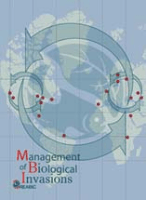
Management of Biological Invasions
Shaping Policies for a Healthier EcosystemManagement of Biological Invasions, published by the Regional Euro-Asian Biological Invasions Centre (REABIC), is a prominent open access journal that has been contributing to the field of ecological science since its inception in 2010. With an ISSN of 1989-8649 and a commendable presence in various ranking categories, it maintains a Q2 ranking in Ecology and Ecology, Evolution, Behavior and Systematics, as well as a Q3 ranking in Management, Monitoring, Policy and Law. This journal is vital for researchers, professionals, and students focused on understanding and managing biological invasions, a pressing issue that affects biodiversity and ecosystem health globally. Operating from Finland, “Management of Biological Invasions” fosters innovative research and facilitates discourse on management strategies through its rigorous peer-review process and dynamic publication schedule, ensuring accessibility for the academic community. As it converges years from 2010 to 2024, the journal continues to serve as a key platform for disseminating knowledge that informs policy, supports ecological resilience, and ultimately guides sustainable management practices.
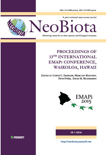
NeoBiota
Exploring the depths of biodiversity and conservation.NeoBiota, published by Pensoft Publishers in Bulgaria, is a preeminent Open Access journal dedicated to advancing knowledge in biodiversity, ecology, and conservation science. Since its inception in 2011, it has established itself as a pivotal platform for scholarly discourse, maintaining an impressive impact factor that places it in the Q1 quartile across multiple categories, including Animal Science and Zoology, Aquatic Science, and Ecology. With its articles indexed in leading databases and Scopus rankings that affirm its standing (e.g., rank #12 in Animal Science and Zoology), NeoBiota serves as a vital resource for researchers, professionals, and students. The journal emphasizes the synthesis of ecological modeling and evolutionary processes, fostering interdisciplinary collaboration and promoting rigorous research methodologies. Authors are encouraged to contribute their insights on biodiversity metrics, ecosystem dynamics, and the ecological implications of anthropogenic changes, making NeoBiota essential for anyone invested in the future of our planet's ecosystems. Discover the treasures of ecological scholarship through this influential journal.